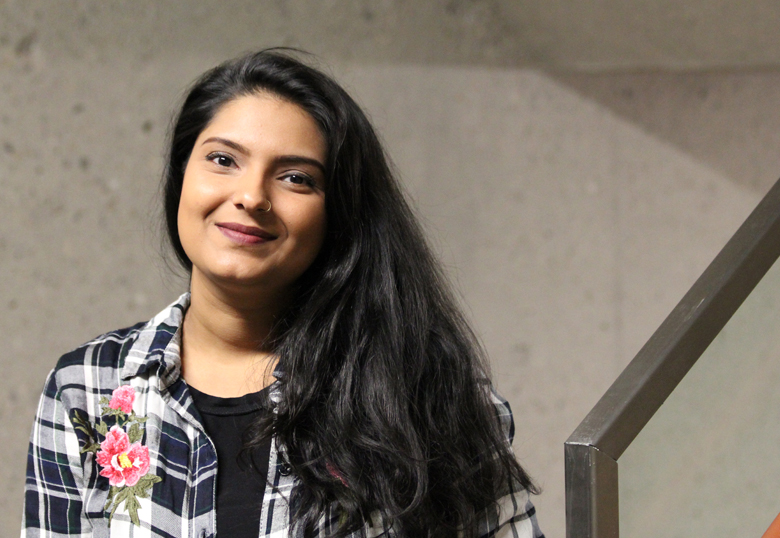Two unique projects earned Rutika Gandhi (BA’14) and Fallan Curtis wins in this year’s Michael Chan Prize in Asian Studies.
The annual prize, named after Michael Wing-Cheung Chan (1952 – 2001), is given to continuing undergraduate or graduate students in any degree program with an interest in Asia-focused scholarship, research or projects. Chan was a Canadian Chinese scientist and humanitarian known for his brilliance in mathematics and his passion for promoting Canada-Asia understanding.
As this year’s winners, Gandhi and Curtis receive $500 each — Gandhi for her essay looking at Buddhism in the digital world, and Curtis for her photo essay comparing biomedicine (Western medicine) and Traditional Chinese Medicine (TCM).
Curtis, an undergraduate student, participated in Dr. Bonnie Lee’s ‘Health and Culture in China’ field

While the field study group was in Hangzhou, Curtis started feeling unwell. The pain intensified, centering in the lower right quadrant of her abdomen and appendicitis was suspected. As her condition worsened, Curtis sought treatment at a hospital. Language proved to be a barrier despite the services of a translator. However, Curtis understood she needed to provide a deposit before treatment could begin. She made emergency calls to family members and secured the deposit. Tests confirmed the infection.
“Basically, over the course of five days, I received copious amounts of antibiotics intravenously and different tests,” she says. “Once they found out that those antibiotics were working and decreasing my white blood cell count, they decided not to operate. If I had presented with the same symptoms here they would have operated immediately. Now that I have had it once, the likelihood of it re-occurring is quite high.”
Students in the field study also visited a TCM hospital and one of the doctors there gave her an acupuncture treatment for appendicitis.
“I don’t think this would have exactly been a productive treatment when the appendicitis was acute, but it was interesting after to get the opportunity to be cared for in a different way,” she says.
Curtis refocused her project and decided to use her experiences and information on the types of health-care systems in a photo essay. She learned that the younger generation in China is more supportive of modern scientific medicine and some people are concerned that TCM will disappear as a result. Integrated medicine, which blends TCM with biomedicine, is also becoming more prevalent.
“There are positives to TCM that biomedicine cannot account for,” she says. “I think one of the most important things TCM has to offer is a better patient-practitioner relationship. So, integrated medicine is a combination of both treatments and studies have shown it to be extremely effective.”
Curtis can’t say enough about the value of her field study experience. The sights, sounds and smells of being in another culture can’t be learned in a book. Winning the Michael Chan prize is a bonus.
“I’m quite honoured. The prize will help me out financially because of this costly trip, so that’s nice,” she says. “I really wanted to share my experiences and I was inspired by the interactive learning experience.”

Gandhi became intrigued by Second Life, an online three-dimensional virtual reality game. Some locales in the game are Buddhist in nature so Gandhi signed up, created an avatar and explored the virtual Buddhist world. Participants can visit temples, burn incense, pray, meditate, do yoga, make donations to a temple and chat with other participants.
“It made me think ‘What does this mean?’ Is it replacing religious activities or is it just another way for Buddhists to connect with each other? Is it just part of globalization?” she says. “I did a bit of research and concluded that it’s not a way for Buddhists to replace offline religious activity; it’s just an extension of it.”
Issues that occur in the real world can also be reflected in the online world. Gandhi turned her attention to a forum known as E-sangha, a popular website that claimed to be transnational and not associated with any particular form of Buddhism.
“Every forum has guidelines that people need to follow or their profiles can be suspended or terminated. E-sangha followed the eight-fold path, which ties their website to some form of authenticity, but their guidelines forbade certain schools of Buddhism from joining, which went against the site’s claim that it was universal,” Gandhi says.
As modern Buddhism evolved from different places around the world, the dynamics between the monastics and laity changed. Traditionally, monks have been authority figures in Buddhism. Now lay people sometimes hold more sway in the online world and the current mindfulness movement in North America is led by mostly lay people and even some who are not Buddhists.
“Overall, what I’m trying to show is that the real world and the online world are not completely separate and that the online world does not replace the offline world. They sort of work in sync with each other and although the online world does not replace the offline world, it can extend some of the issues that are going on,” she says.
Winning the Michael Chan prize was unexpected but welcome news and the money will help her pay tuition fees.
“I always try to keep a positive outlook on things but I also don’t want to set myself up for disappointment,” Gandhi says. “I knew it was a good paper but when I actually saw the email that I won I was pleasantly surprised and really happy.”
